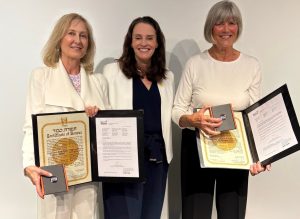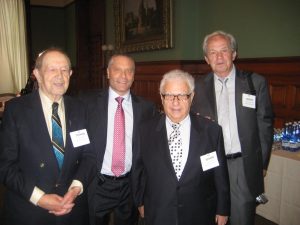A global search is now underway for witnesses to participate in what will likely be one of the last Holocaust-era war crime trials.
The accused, who is identified by German law as N.N., volunteered for service with the SS and served as a guard at Ravensbruck concentration camp from April 1943 to March 1945. Ravensbruck was known as a woman’s camp, although it also had a section for men.
About 20 witnesses around the world have been identified so far, said Efraim Zuroff, director of the Simon Wiesenthal Center office in Jerusalem and coordinator of Nazi war crimes research.
German law gives survivors who were in the camp at the same time as the defendant, or next of kin of someone who was murdered in the camp, the right to make a statement to the court.
“Just yesterday, I got a phone call about a survivor in Uruguay who is 99 years old and her sister who is 96, and they are both in good mental states,” Zuroff said in an interview from Jerusalem, about the search for potential witnesses.
Survivors can testify online and do not need to travel to Germany for the trial.
What is worrying, however, is the advanced age of both the defendant and the survivors.
Doctors with expertise in geriatrics examine the defendants and are not “fooled” by those who are “posing as ill people who are incapable of being brought to justice,” Zuroff said.
N.N., who is 98, has already been examined by a medical expert and has been classified as fit to stand trial, for two to three hours a day, twice a week, according to a memo from retired Judge Thomas Walther, who has volunteered to represent witnesses in the case.
The trial is expected to begin in early October 2023, Walther wrote.
Zuroff is hopeful that the case will proceed. In June, Joseph Schuetz, who was a guard at Sachsenhausen camp, was convicted of complicity in war crimes at the age of 101.
At the time, Zuroff was told that another eight cases, including the Ravensbruck one, were being investigated by Germany.
The difficulty is that once a case is identified as credible by a central German office, it is shifted to local prosecutors who can find reasons to delay until it is too late, Zuroff said.
“I jokingly say I’m the only Jew in the world who prays for the good health of the Nazis, but only those who can be brought to justice.”
The trials are important to educate people who may have only heard about Auschwitz, he added.
“It’s important to understand the scope of the Holocaust, the horrors that these people suffered in these camps that weren’t well-known.”
German law changed 14 years ago, so that the prosecution no longer needs to prove that a specific crime was committed against a specific individual and was motivated by racial hate, a standard that was “practically impossible,” Zuroff said.
Now individuals are tried solely based on the fact that they served in a concentration or death camp during a specified time.
Witnesses do not need to remember a particular guard, but must only prove that they were in a camp during those dates and were the victims of crimes against humanity, said Jaime Kirzner-Roberts, director of policy for Friends of Simon Wiesenthal Center in Canada.
“The witnesses will testify to starvation of inmates, beating of inmates, the abuse of inmates, the murder of inmates, medical testing of inmates whether or not it directly involved the guard or not,” she said.
In Canada, about 30 or 40 people have responded to the call for witnesses, which was only issued about a week ago. So far, two people who are eligible to participate have been identified.
“We’ve had a huge number of responses but most were ‘my mother was there, my grandfather was there… but those people are no longer with us.’”
“I have people contacting me saying ‘my mother was at the camp but I don’t even know if I even want to bring this to her,’” she said. “This is a very fraught and emotional process that we have to go through with every family that decides to participate.”
Identifying the best witnesses in these cases is challenging, Kirzner-Roberts said. She was responsible for finding Canadians who could participate in the Sachsenhausen trial and spoke to about 1,000 people before finding two people whose credibility could stand up in court.
In some cases, people were in the camp during the right dates, but had no documents. At liberation, the Nazis burned many of their records, making it difficult for inmates to prove they were in the camp.
In a subcamp of Sachsenhausen, as in many camps at war’s end, fleeing Nazi guards committed mass murder, but because there were no death records it has been very hard for families to find justice, she said.
“It’s been much more challenging that I would have imagined to find people eligible to participate, under the rather narrow confines of what is possible under German law.
“The whole thing is so shameful, that we’re forcing people in their 90s to testify because these people should have faced trial decades and decades ago, but here we are.”
For information about the Ravenbruck trial, email [email protected]







